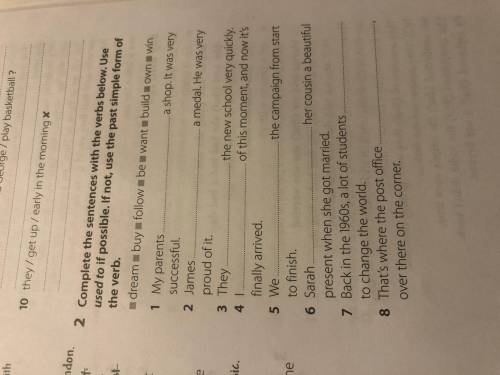Complete the sentences with the verbs below. Use used to if possible. If not, use the past simple form of the verb.

Другие вопросы по теме Английский язык
Популярные вопросы
- Определи верное неверное утверждение об особенностях митоза и мейоза ...
3 - Русская Летиратура Тема:«Весенняя сказка» А.Н. Островского «Снегурочка»...
1 - Тезисный конспект про михаила зощенко с меня лайк и звёзды...
2 - Используя схему взаимосвязей между компонентами экосистемы, соотнеси названия...
2 - PALOTAB TAPE 3Выполни задание, объясни записиРебята сделали модель Земли в форме...
1 - Выбери вариант, соответствующий оценке критиком И.А. Гончаровым таланта А.Н....
1 - английский Why do people stop reading blogs?Whom did Alex invite?Why did they...
2 - Казахские национальные блюда определи в каком случае подавали отварную голову...
3 - Дом Стол Урок 4-я четвертьМСО «Бесплатная общеобразовательная школа»Алматинская...
1 - 8. Площа ДВС дорівнює 98 см. Точка К поділяє його медіану BM у відношенні 4:3,...
1
Answer: My grandfather used to smoke a pipe when he was younger.
Explanation: "Used to" is used to talk about past habits or regular actions that no longer happen in the present. In this sentence, the action of smoking a pipe was a regular habit in the past, but it no longer happens now.
2. Sarah _______ (play) the piano when she was a child.
Answer: Sarah used to play the piano when she was a child.
Explanation: Again, "used to" is used to talk about past habits or regular actions. Playing the piano was a regular activity for Sarah in the past, but she may not do it anymore.
3. They _______ (live) in New York before they moved to Chicago.
Answer: They used to live in New York before they moved to Chicago.
Explanation: Here, "used to" is used to talk about a past situation or state that has changed. They lived in New York in the past, but they no longer live there as they moved to Chicago.
4. We _______ (go) to the beach every summer during our childhood.
Answer: We used to go to the beach every summer during our childhood.
Explanation: Once again, "used to" is used to talk about past habits or regular actions. Going to the beach every summer was a regular activity for us when we were children, but it may not happen anymore.
5. Jenny _______ (have) a pet dog when she was little.
Answer: Jenny had a pet dog when she was little.
Explanation: In this sentence, the past simple form of the verb "have" is used instead of "used to" because "used to" is not applicable in this context. The action of having a pet dog was a temporary situation in the past but is not a regular habit.
Overall, the use of "used to" or the past simple form of the verb depends on whether the action is a past habit or a temporary situation. "Used to" is used for habitual actions, while the past simple form is used for actions that occurred in the past but were not habitual.